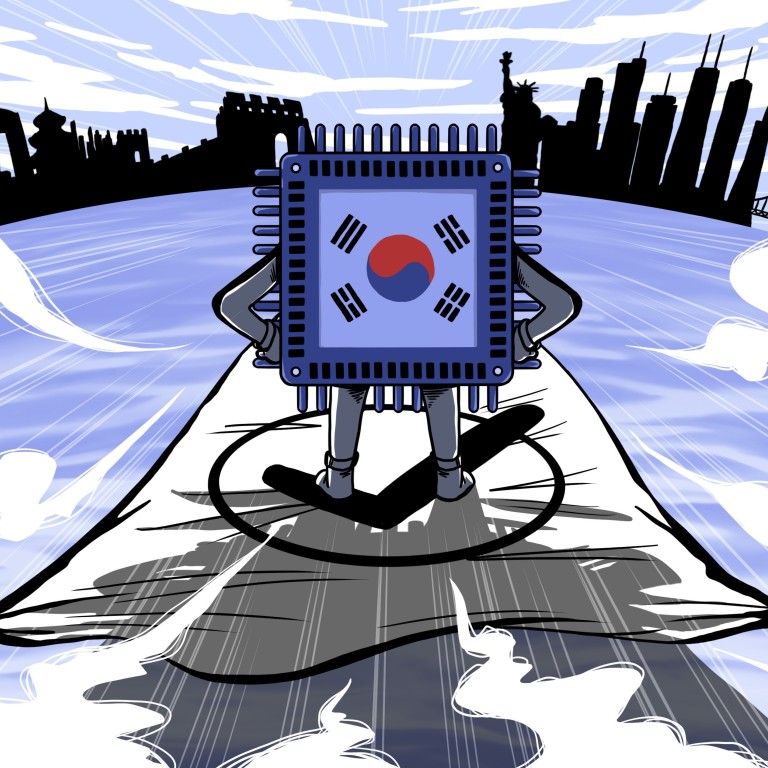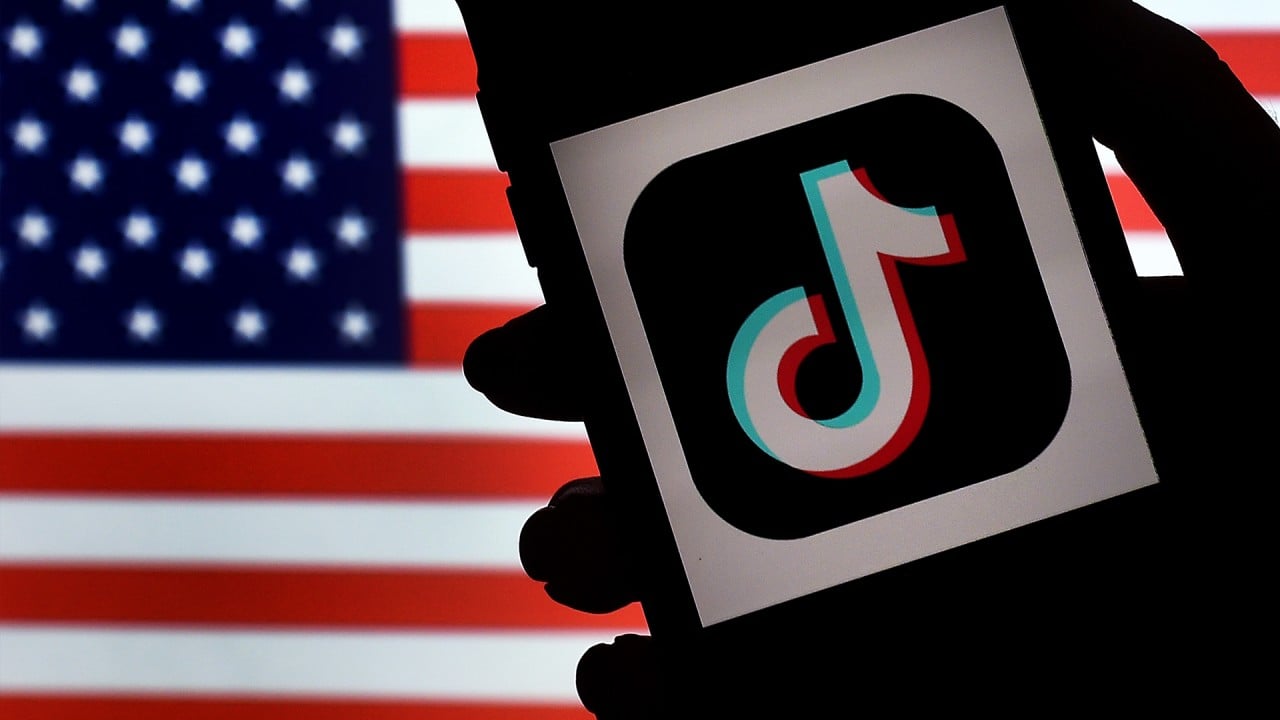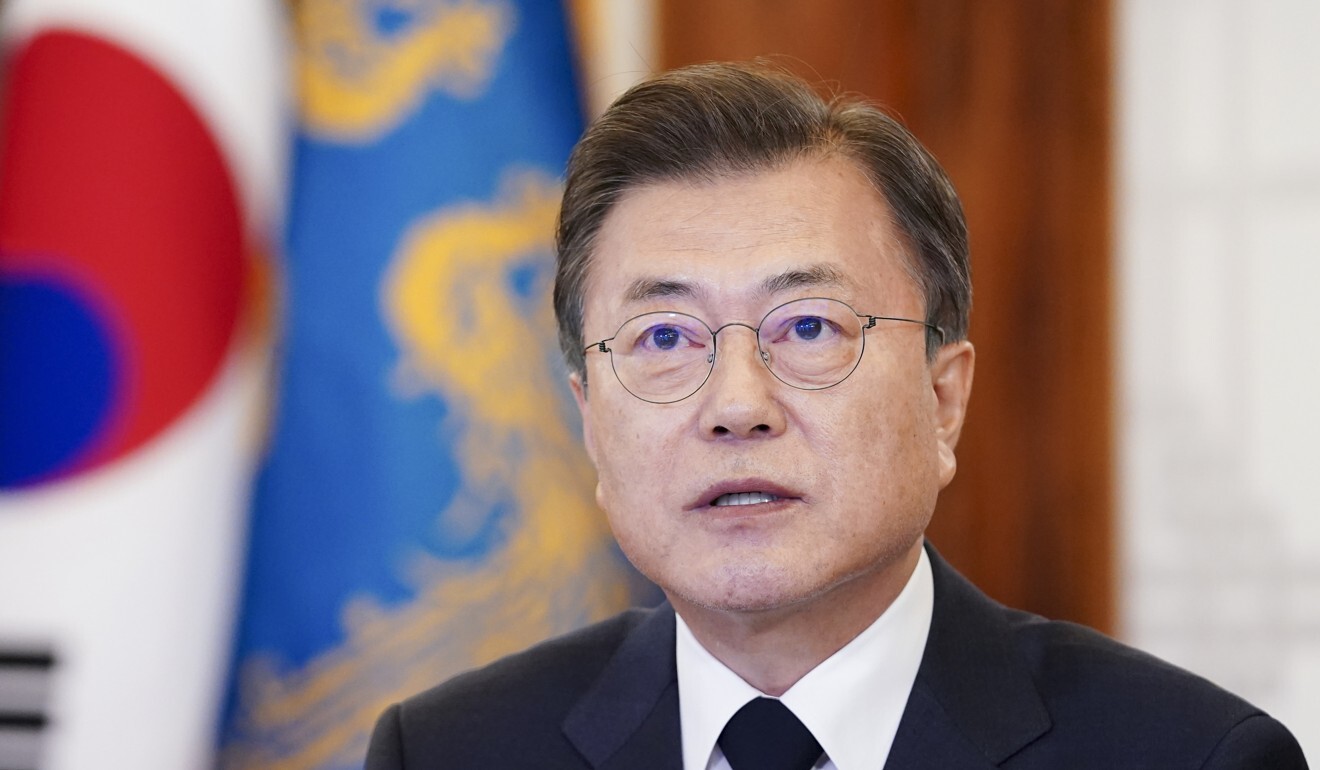
Will South Korea’s chip sector have to take sides in the China-US tech war?
- Under Moon Jae-in, Seoul has charted a middle course between its biggest semiconductor market and its traditional military ally
- But that could change if a conservative candidate wins the South Korean presidency, observers say
This is the first in a two-part series on the potential impacts of presidential elections in the region on relations with China and the United States. Here, Laura Zhou and Eduardo Baptista examine the challenges a swing in the electoral pendulum could pose for South Korea’s semiconductor industry.
Semiconductors are crucial to almost every industry in the modern economy, from mobile phones to cars and defence facilities, and in March alone, China, including Hong Kong, accounted for 60 per cent of South Korea’s exports of the products, according to Seoul’s Ministry of Trade, Industry and Energy.
On the other side is the United States, a traditional military ally and owner of many of the semiconductor technologies that have helped transform South Korea into a hi-tech powerhouse.
Samsung, for example, is a leading world player in mobile processor design, but the key technologies, from the core semiconductor intellectual property to design software and fabrication tools and materials, are dominated by US companies.
South Korean President Moon will visit White House on May 21, confirming ‘ironclad alliance’
At the time, the South Korean officials followed the line of neutrality, telling their US counterparts that the issue was “a matter for private businesses to decide” and the government had no position to intervene, according to South Korean news agency Yonhap.
Earlier this month, Biden told a virtual conference of international companies, including Samsung, that he would pursue “aggressive” investment in the semiconductor supply chain.
“I’ve been saying for some time now: China and the rest of the world is not waiting, and there’s no reason why Americans should wait,” he said, according to a transcript released by the White House.

03:07
Stop offering ‘untrusted’ Chinese apps like TikTok and WeChat, Washington urges US tech companies
On Tuesday, US Commerce Secretary Gina Raimondo called for a major increase in US production capacity for computer chips, saying the push could create jobs and reduce the country’s reliance on mainland China and Taiwan.
“Right now we make 0 per cent of leading-edge chips in the United States. That’s a problem,” Raimondo said on Tuesday in a virtual conference of the Council of the Americas, a business group. “We ought to be making 30 per cent, because that matches our demand. So we will promise to work hard every day, and in the short term also see if we can have more chips available so the automakers can reopen their factories.”
Last week, Ford warned that the chip shortage may slash second-quarter production by half, costing it about US$2.5 billion and about 1.1 million units of production in 2021.
General Motors said on Friday that it would extend production suspensions at several North American factories because of the shortage.
For Samsung, the stakes are particularly high. In the first half of 2020, sales revenue from mainland China for Samsung Electronics, the conglomerate’s chip-making arm, surpassed that of the North American market, to be 27 per cent of its total revenue.
So far, neither Samsung nor the South Korean government has showed a willingness to pick sides, but there has been growing consensus in South Korea that the chip issue is more than an economic matter – it is increasingly about its foreign policy, according to a government source.
South Korean President Moon will visit White House on May 21, confirming ‘ironclad alliance’
That foreign policy could change if large swings against Moon’s Democratic Party in mayoral elections in Seoul and Busan in early April are reflected at the presidential polls in March next year.
Both the popularity of Moon and his party have taken a hit over the country’s handling of the coronavirus pandemic, as well as a series of scandals in which officials in his administration allegedly used insider information to profit from property deals. According to a survey by Realmeter on Sunday, Moon’s popularity dropped to a new low of 33.8 per cent and the Democratic Party’s to 30.7 per cent, while the conservative opposition People Power Party had an approval rating of 36.6 per cent.
Moon Chung-in, a former national security and foreign affairs adviser to President Moon Jae-in, said that although it was still too early to make predictions the conservatives had a “good chance” of winning next year’s elections.
Cheng Xiaohe, an associate professor of international studies at Renmin University in Beijing, said Moon had been able to maintain good relations with Beijing but the conservative party had traditionally been more suspicious of China.
“[President] Moon’s governing philosophy, both in terms of his policy towards North Korea and the development of China-South Korea relations, is relatively close to China’s views, and this is why the relationship between China and South Korea is still relatively well maintained at a time of intense strategic competition between the US and China,” Cheng said.
“It is not necessary that a conservative leader would completely side with the US and sour relations with China, but if the conservative party came to power, it is expected to seek closer ties with the US.
“If the relationship between China and the US remains so highly competitive, the relationship between South Korea and China may be somewhat distant.”

In a worst-case scenario for Beijing, a conservative government would try to join a trilateral coalition with the US and Japan to encircle China militarily, according to Moon Chung-in, now chairman of the South Korean Sejong Institute think tank.
“Suppose we wholeheartedly take sides with the US against China, and then we are obliged to send our military forces to the South China Sea, or cross the Taiwan Strait, and then we would have to accommodate the US demands for additional deployment of THAAD, and also we might have to accommodate American demands to deploy intermediate-range ballistic missiles in China,” he said, adding that they would be extremely difficult requests to realise.

The THAAD fallout could be a precedent for the economic implications for South Korean companies once again caught between US and Chinese interests.
Cheng said that whatever the case, it was “highly likely” that South Korea would be pulled into the tech pull of the US.
“Looking at the general trend, it’s only a matter of time when South Korea would eventually fall into the chip orbit of the US as long as Washington makes no major mistakes in its South Korea policy,” he said.
Moon, from the Sejong Institute, said that if South Korean semiconductor manufacturers like Samsung and SK Hynix chose, or were forced, to cut ties with the Chinese market, the entities and the South Korean economy would sustain “enormous damage”.
If Biden forced a conservative-led South Korea to choke off China’s supply of semiconductors, it would also antagonise liberals and progressives and show that “there is no difference between the Biden administration and the Trump administration”, he added.


